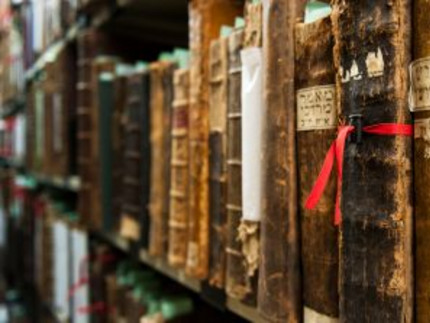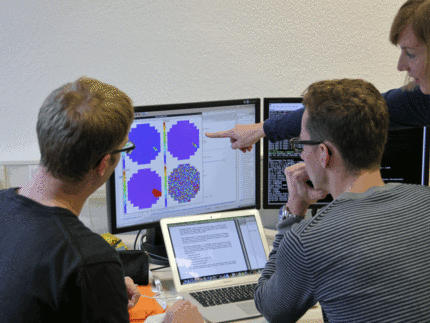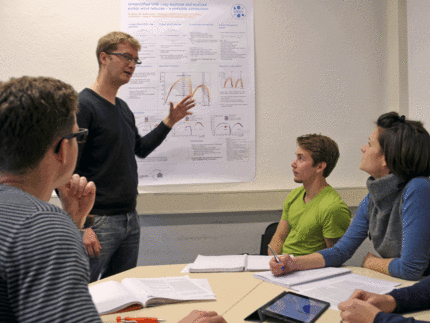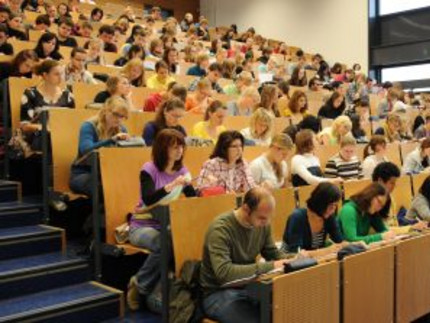Experimental Astroparticle Physics — Teaching
Theses
If you are interested in doing your Bachelor, Master, or Ph.D. thesis with us, get in contact with Dr. Kathrin Egberts or drop by in our offices 2.131 and 2.134 in building 28. Research areas for theses are:
- The population of Galactic gamma-ray sources, details of the population modelling, the role of source confusion
- Correlations on the multi-messenger night sky
- Deep learning methods in gamma-ray astronomy
- Talk with us about your own ideas!
________________________________________________________________________
open position at Potsdam University: ./.
Research for Master students (by arrangement)
- Introductory Project Astrophysics: The students select an upper-level seminar and an introducy project in the same topic area. The topic of the introducy project generally corresponds to their specialization are for their Masters thesis.
> Monday 16:00 - 20:00 / Golm, Bldg. 28, Room 2.28.2.011
* Master of Science Astrophysics, module PHY-941 * * Master of Science Physics, modules 941, PHY-941 *
- Research training Astrophysics: The students carry out a supervised independent study and a guided lab in the field of the Masters thesis. The supervision and guidance are provided in regular consultations with the supervisor(s). > Friday 10:00 - 12:00 / Golm, Bldg. 28, Room 2.28.2.011 * Master of Science Astrophysics, module PHY-942 * * Master of Science Physics, modules 942, PHY942 *
Seminars
Winter term 2025/26:
Experimental Astroparticle Physics: Research seminar - Members of the experimental astroparticle physics group, including PhD and Master students as well as guests, present and critically discuss their current science work. The level of presentation shall be comprehensible for advanced students of the field.
- S / Friday 16:15 - 17:45 / Golm, bldg. 28, room 2.28.2.011
* Master of Physics modules 731, 732, 941, PHY941 * * Master of Astrophysics module PHY-941 *
Lectures
Winter term 2025/26:
Particle Physics:
* Master of Science Physics, modules 731, 732 * * Master of Science Astrophysics, module PHY-735 *
Huge facilities, like the Large Hadron Collider at CERN, aim at revealing the innermost structures of matter and the fundamental forces acting on these elementary constitu- ents. Over the past decades the standard model of particle physics has evolved from their ndings, and its last piece, the Higgs particle, was discovered only recently. This lecture will provide an introduction to particle physics and its standard model and discuss some of the experimental methods used to detect and study elementary par- ticles and their interactions. Finally, an outlook to phenomena and theory beyond the standard model of particle physics will be given.
- L / Monday 10:15 - 11:45 / Golm, bldg. 5, room 2.05.1.12
- E / BP1 + BP2 Monday 12:15 - 13:45 / Golm, bldg. 5, room 2.05.1.12 // BP1 biweekly > start 13.Oct.25
_____________________________________________________________________________________________
Introduction to the Astronomy:
* Bachelor of Physics, modules PHY131c, 131c *
* Master Teaching Physics, module PHYAM02.02 *
This lecture gives a basic introduction to the research topics of Astronomy, including the diverse links with other branches os science. We look at the different states of matter in the cosmos and their spatial arrangement, from our solar system to the stars of our Milky Way to distant galaxies and the large-scale structure of the universe. We will provide brief insights into some current topics of astronomical research, such as the search for exosolar planets or the exploration of black holes. The question of how astronomical knowledge is gained is also an important topic; we treat methods and instruments of astronomical observations. Finally we will also deal with the importance of astronomy for the scientific worldview; this includes some scientific-historical considerations. The lecture will accompanied by weekly exercises.
- L / Wednesday 14:15-15:45 / Golm, building 28, room 2.28.0.108
- E / BP1 Wednesday 16:15 - 17:45 / Golm, building 28, room 2.27.0.01
- E / BP2 Wednesday 08:15 - 09:45 / Golm, building 5, room 2.5.01.12 // biweekly > start 22.Oct.25
- E / BP3 + BP4 Wednesday 12:15 - 13:45 / Golm, building 5, room 2.5.01.12 // biweekly > BP3: start 22.Oct.25 ; > BP4: start 15.Oct.25
Previous terms:
- Summer term 2025: Astroparticle Physics / Aspects of Astroparticle Physics / Selected topics of Astroparticle Physics Experimental Physics IV -> Atoms-Nuclei-Elementary particles
- Winter term 2024/25: Particle Physics
- Summer term 2024: Astroparticle Physics / Aspects of Astroparticle Physics / Selected topics of Astroparticle Physics Experimental Physics IV -> Atoms-Nuclei-Elementary particles
- Winter term 2023/24: Particle Physics
- Summer term 2023: Astroparticle Physics Experimental Physics IV -> Atoms-Nuclei- Elementary particles
- Winter term 2022/23: Particle Physics
- Summer term 2022: Astroparticle Physics Experimental Physics -> Atoms-Nuclei- Elementary particles
- Winter term 2021/22: Particle Physics
- Summer term 2021: Astroparticle Physics Experimental Physics -> Atoms-Nuclei- Elementary particles
- Winter term 2020/21: Particle Physics
- Summer term 2019: Astroparticle Physics Experimental Physics -> Atoms-Nuclei-Elemetary particles
- Winter term 2018/19: Particle Physics
- Summer term 2018: Astroparticle Physics Experimental Physics -> Atoms-Nuclei-Elementary particles
- Winter term 2017/18: Particle Physics
- Summer term 2017: Astroparticle Physics
- Winter term 2016/17: Particle Physics
- Summer term 2016: Experimentelle Astroteilchenphysik
- Summer term 2015: Gammaastronomie
- Winter term 2014/15: Astroteilchenphysik
- Summer term 2014: Particle Detectors




